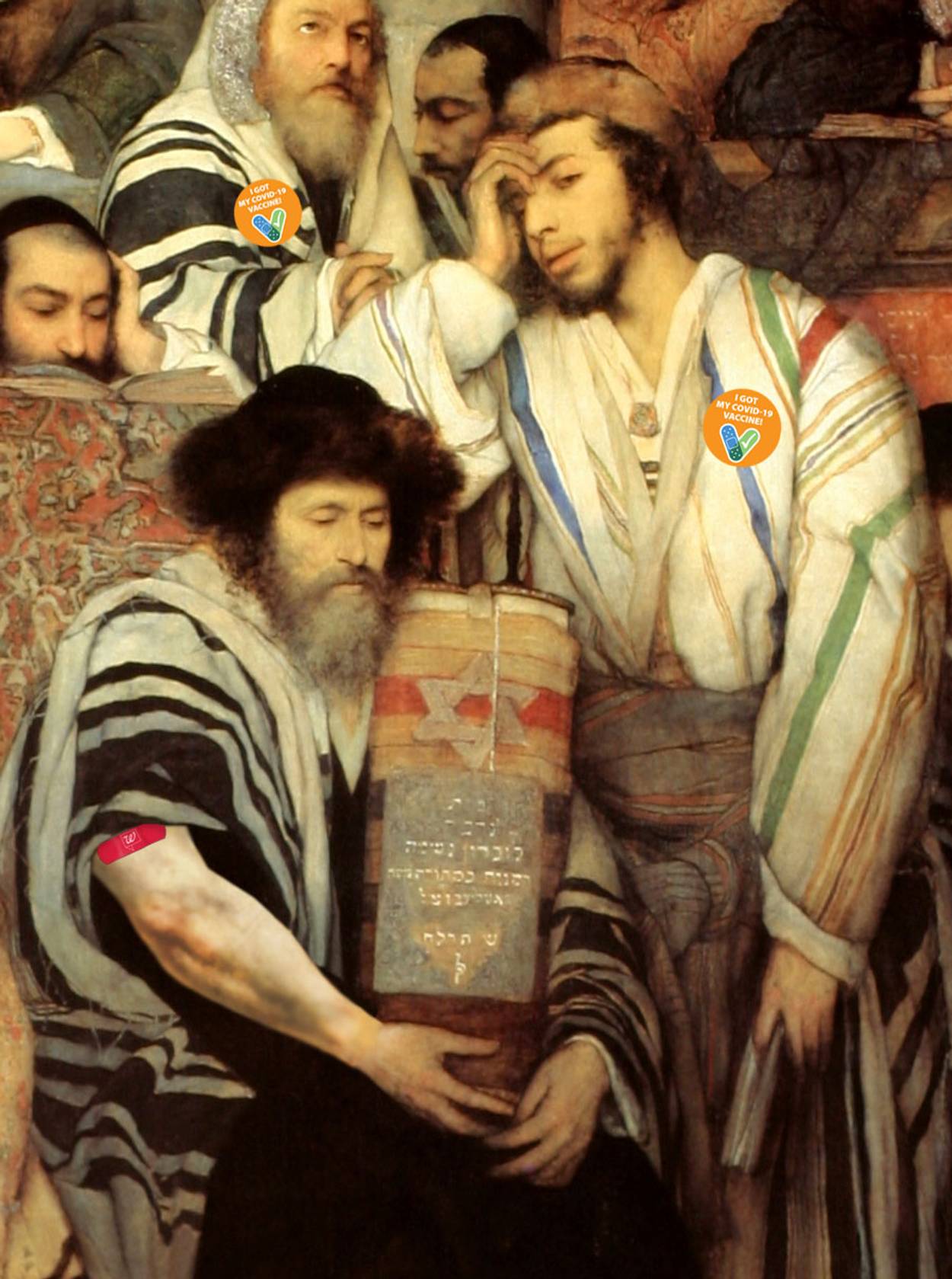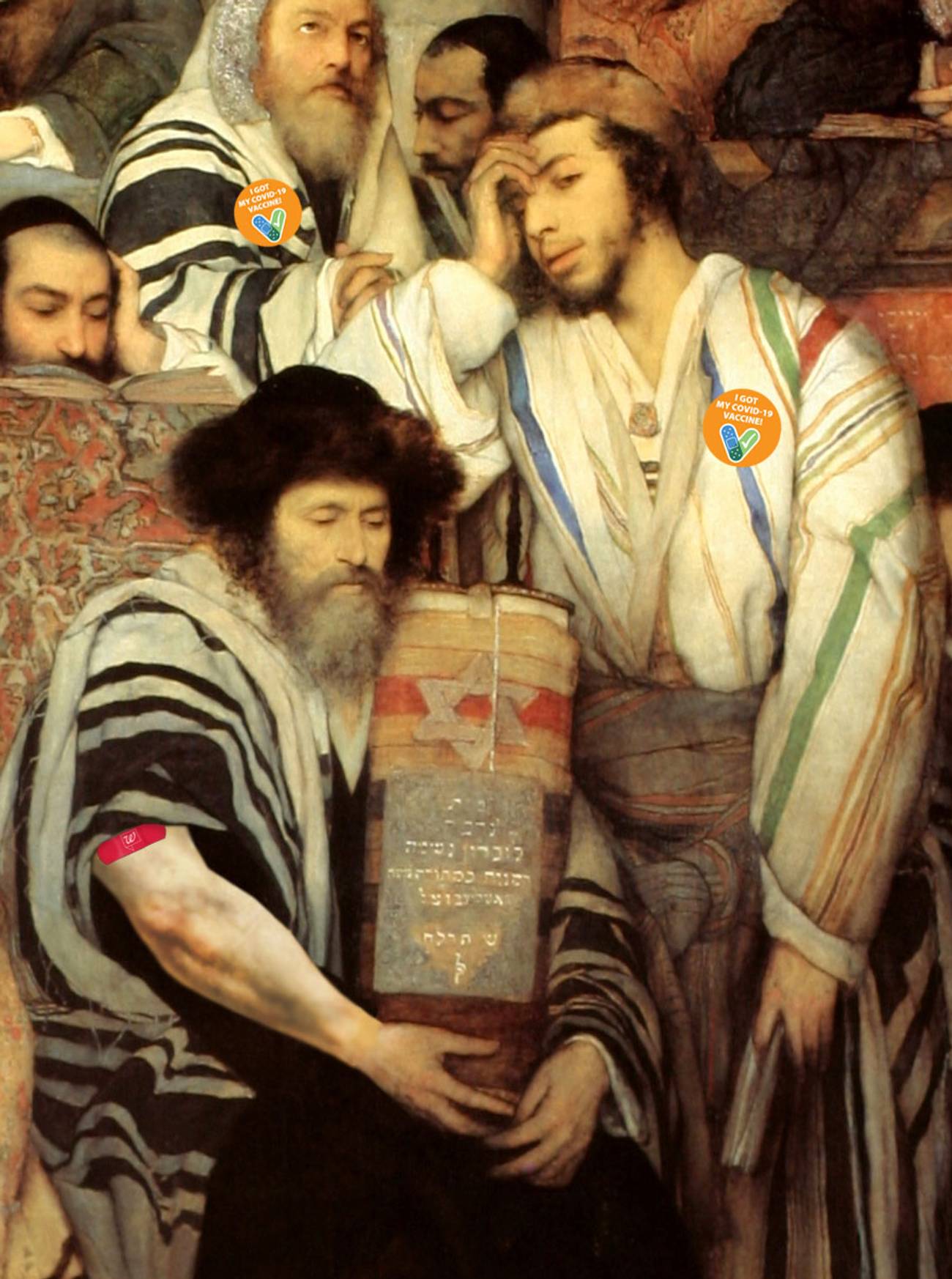No Shots, No Service
Bar the unvaccinated from my synagogue? As a rabbi, I have no choice.




I am a biographer, a Jewish studies scholar and professor, and a Tablet columnist. I am also a rabbi; I have served the Fire Island Synagogue since 1997. I write this essay, as the new year dawns, as a rabbi. I do so in part because Liel Leibovitz’s recent essay “Our Bodies, Our Shuls,” in which he urges us rabbis to admit congregants to services regardless of their vaccination status, is written as an open letter to rabbis, and thus an open letter to me.
Like many synagogues, the Fire Island Synagogue has struggled mightily this summer to create protocols for policies regarding the High Holidays. In the beginning of the summer, most of us thought that by September the pandemic would be mostly behind us, and we would reconvene on Rosh Hashanah as usual. By mid-summer we realized that was not the case. The rise in cases, the persistence of voluntarily unvaccinated people, and the delta variant made it necessary to make difficult decisions about attendance at a service for which the synagogue would be packed with an intergenerational congregation. There were numerous cases of COVID-19 in our towns on Fire Island this summer, including a number of breakthrough cases. Thus, we decided that aside from requiring vaccinations for High Holiday attendees, we are also requiring masks. Children and their parents or loved ones can attend on the back deck, which is outdoors.
Every rabbi I know is making every effort to include as many people as possible this holiday season—about that need, there is no debate. But Leibovitz raises a different argument. He is saying that even though protocols of restaurants, movie theaters, and other indoor spaces are increasingly requiring proof of vaccination to enter, synagogues should be different and should open their doors to whoever wishes to attend—that is, to people who are unvaccinated. And he claims that “[a]ny congregation that takes any measure that bars any Jew from praying in communion on the Days of Awe”—like requiring vaccination, or asking for proof of it—“is divesting itself from the very core of Jewish life.” He goes as far to suggest that “attempting to avoid” risk altogether is a form of “idolatry.”
But this gets a whole lot wrong. First, it’s a deep misunderstanding of “idolatry,” the biblical concept of avoda zara. What idol is being served? What absolute value is being substituted for divine worship? Maximizing the safety of the community? Hardly idolatrous. But more important, while it gets right that synagogues are different, it misunderstands how. For while it’s true that a synagogue is not a restaurant or movie theater, it differs mainly in that it represents, and contains, a community of people who must care more deeply about each other’s well-being, not less. And the rabbi, as mara d’atra, or spiritual leader, must be more concerned about ensuring the safety of all those who enter.
Let’s begin with the place-of-business analogy and see how far it gets us. Let’s agree that none of us has a right to eat in a particular restaurant. We do so at the discretion of the proprietor. The classic illustration is one we all know: “No shoes, no service.” It may not be illegal to eat barefoot in a restaurant, but each owner has the right to set his or her own rules of service. If a customer enters with a Camp Auschwitz sweatshirt, the owner has the right to ask him or her to remove it or leave the premises. The owner may not, of course, ask people to leave because of who they are, that would be discrimination, only because of what they do or do not do.
In this respect, synagogues are indeed like other establishments. We can bar people who harass other congregants. We don’t allow adult naked people in shul, to take a silly example. Here is a more serious example. If I walk into a synagogue with a loaded weapon, even if that weapon is licensed, can I claim discrimination if the rabbi prohibits me from entering? Or this: If I walk into a crowded synagogue obviously ill, say with the flu, is it discrimination for the rabbi to ask me to leave?
As a rabbi, am I “divesting” the sick person “from the core of Jewish life” if I say that his or her presence threatens the public good? No. Nobody could seriously argue this. The rabbi would be treating him in a way that honors the core of Jewish life by safeguarding his or her community. For while Jews do have a certain right as Jews to pray in a synagogue, and it is different—more robust, more consequential—than a person’s right to eat fries in a Shake Shack, that right is not absolute or unalienable; it has limits and its limits are directly related to the public good. A rabbi can deny entry to a convicted pedophile if children are present, without being accused of discrimination. The reason is because the rabbi is responsible for the public good and safety of his or her congregants. Keeping away the contagious, or people who are vulnerable to contagion, the harmful, those who tear at the fabric of the community—any rabbi who did not act this way would lose the respect of her community, and rightfully so.
Does this reasoning apply to people who choose to remain unvaccinated? I think it does. Perhaps we can agree that if there is a credible threat of an antisemitic act, a synagogue should maintain a security detail to ensure the safety of the congregants inside. I suggest that the virus is a threat and the vaccine is the security. No security measures are foolproof, but they are necessary to minimize the potential for danger.
In such a case, unvaccinated people are not being “discriminated” against. They are being refused entry not because of who they are, but because of what they have chosen not to do. Again, this kind of separation from people who refuse to do what the community requires has many analogues in normative Jewish practice—for example refusing to welcome a recalcitrant husband, one who refuses his wife a get, or divorce decree. Ostracizing, or refusing to socialize with, the antisocial Jew is an important right for a community. Radical inclusion in a synagogue never has been, no should be, an absolute value. People of good faith can disagree on whether the unvaccinated are being antisocial in this way, but if one concludes that they are, barring the door is not an inappropriate remedy, or some break with traditional values of inclusion.
Of course, there must always be a path to repentance, to being welcomed back. And indeed I think I speak for most rabbis in saying that unvaccinated people are fully welcome to come and pray in synagogue this Rosh Hashanah. All they have to do is get vaccinated. The same way a gun owner is welcome in my synagogue if he or she leaves their gun at home. The way a gonif is welcome if she makes restitution. The way a naked person is welcome if he puts on pants—and in this case, it’s not anyone’s health at stake, but merely the propriety and seemliness of the occasion; and yet nobody would doubt the rabbi’s right to act as she sees fit.
Rabbis should be leaders in these matters. In the most important way, synagogues are totally unlike restaurants and movie theaters: Rabbis are responsible for their congregants. If there were a life-threatening storm approaching, I would tell my congregants to stay home. In a famous story—perhaps apocryphal—Rabbi Israel Salanter (1809-1883) stood on the pulpit on Yom Kippur during a cholera epidemic and told his congregants to eat.
People who choose to remain unvaccinated are making a choice. They are free to make that choice. And rabbis are free to say that their choice makes it impossible for them to be a part of the congregation that stands before God on Rosh Hashanah. The rabbi is not denying them anything; they are, sadly, denying themselves the opportunity to pray with a collective.
Numbers clearly show that a large majority of COVID-19 cases are in unvaccinated people, and a large percentage of breakthrough cases come from unvaccinated people. One does not need to be a Talmudist to draw the obvious conclusions—and many important Talmudists are at last drawing them. The other day, the Israeli daily Israel Ha-Yom stated that Haredi and National Religious rabbis in Israel, many of whom were slow to respond to COVID-19 early on, have rendered Halachic decisions prohibiting unvaccinated people from entering a synagogue. Rabbi Chaim Kanievsky, a leading Haredi posek, also ruled that unvaccinated teachers are prohibited from entering a classroom to teach. פסק הלכה: סרבני חיסונים לא ייכנסו לבתי כנסת
It is true that we can never create a totally pure environment for communal prayer. We stand before God spiritually and physically impure and imperfect. But we can, and should, create a physical space that maximizes safety and protects the vulnerable. If that means that small children cannot accompany their loved ones to synagogue in 2021, so be it. Their spiritual lives will not be forever blemished.
Of course, we cannot abandon children; we cannot abandon anyone. As a rabbi, I see it as my duty to help congregants bring Judaism into their homes, creatively, especially in pandemic times. We as clergy are given a sacred task to facilitate Jewish worship. That task includes promoting worship daily, and everywhere—but also ensuring, as much as possible, that the spaces where we worship are safe.
We rabbis have seen what happens when spaces are not. We rabbis have officiated at many COVID-19 funerals and sat shiva with many families who mourned the untimely, and in some cases unnecessary, deaths of loved ones. The pundits and provocateurs have not seen what we have seen—so for the coming High Holiday season, while we rabbis welcome their presence (if vaccinated), and their prayers, we do not need their advice.
Shaul Magid, a Tablet contributing editor, is the Distinguished Fellow of Jewish Studies at Dartmouth College and Kogod Senior Research Fellow at The Shalom Hartman Institute of North America. His latest books are Piety and Rebellion: Essays in Hasidism and The Bible, the Talmud, and the New Testament: Elijah Zvi Soloveitchik’s Commentary to the Gospels.